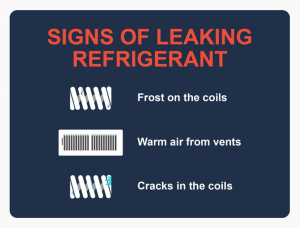As a business owner, it’s imperative to have a well-functioning commercial HVAC unit. Responsible for regulating all indoor building climate, a properly maintained HVAC unit will guarantee comfortable temperatures for your clients and employees. It will also improve air quality throughout your building, and ultimately save your business from costly repairs.
Our contractors in the Portland and Beaverton area have over 50 years of commercial HVAC repair. We invite you to contact us with any questions or concerns about your commercial unit.
What is HVAC Refrigerant and How Does it Work?
In simple terms, refrigerant is an essential compound used in the heat pump of your HVAC system. Without it there would be no air conditioning or refrigeration. Fluctuating from a gas to liquid and back to gas as it cycles through your system, refrigerant absorbs heat from the surrounding environment, and vents it outside.
Copper coils, located inside air conditioning units, house the chemical refrigerant. As the chemical pulls heat from the air, it transforms from a low-pressure gaseous state to a high-pressure liquid. Then, the internal air conditioning mechanisms, force the refrigerant outside where a fan blows hot air across the coils.
Once cooled, the refrigerant returns to its original gas form, and another internal fan blows the now cool air throughout your building. This cycle repeats throughout the day. If your HVAC unit is functioning properly, and not leaking, refrigerant helps keep your commercial climate cool and comfortable.
Types of Refrigerants in Heating and Cooling Systems
It’s important to know what kind of refrigerant your HVAC unit contains, as older types can have a negative environmental impact and cause your HVAC system to run less efficiently. Here are some of the main refrigerants used in HVAC systems:
- Chlorofluorocarbons (CFCs), or R12s: CFCs are known to contribute to the greenhouse gas effect and can have damaging environmental consequences. If your older air conditioning unit still utilizes R12 refrigerant, it’s time to call your Portland HVAC contractor and learn about new, safer options.
- Hydrochlorofluorocarbons (HCFCs), or R22s: While better than CFCs, HCFCs aren’t without their environmental complications. As part of the Clean Air Act, all HCFCs will be phased out by 2020. Get ahead of the curve and let our technicians help you select an energy-friendly, eco-safe HVAC unit for your commercial business.
- Hydrofluorocarbons (HFCs), or R410A and R134s: Without the damaging chemicals found in R12 or R22s, HFCs are more efficient and provide better air quality.
What are the Causes of Leaking Refrigerant?
Refrigerant leaks are the main mechanical problem with air conditioning units. Being aware of the typical causes can help you remedy the situation before it escalates. Let’s look at some of the main stressors that can affect your HVAC system:
- Vibrations from day-to-day equipment operations
- Normal wear and tear on the joints and connections
- Corroding copper in the coil
These causes might be hard to see from the outside, so it’s necessary to schedule a routine maintenance and checkup of your air conditioning system. Our skilled HVAC contractors in the Portland metro area can assess the health of your unit and take care of any needed repairs.

What are the Signs of Leaking Refrigerant?
While leaking refrigerant can be difficult to diagnose without professional help, there are a few indicating factors. If your HVAC unit has a major leak, or has been slowly leaking over an extended period, here are a few telltale signs:
- Warm air, instead of cool air, blowing out of the vents
- Visible holes or cracks in the coils
- Frost on the coils, or a buildup of condensation
Contact one of our HVAC contractors right away if you notice any of the issues listed above. Not only does leaking refrigerant cause further damage to your HVAC unit, but the refrigerant itself may also be toxic and hazardous to your building dwellers.
Does Your Business Need a New HVAC System?
If the exterior component of your air conditioner reads R22 or R12, then it’s time to invest in a new unit. When you are ready to explore your upgrade options, contact us at AAA Heating and Cooling for recommendations, services, and installations.
To properly diagnose and remedy any problems with your unit, it’s important to let your professional HVAC contractor handle any leaking refrigerant concerns. Click here to learn more about our commercial services, or stop by one of our locations in Beaverton or Portland to get a full diagnostic checkup and schedule any repairs.